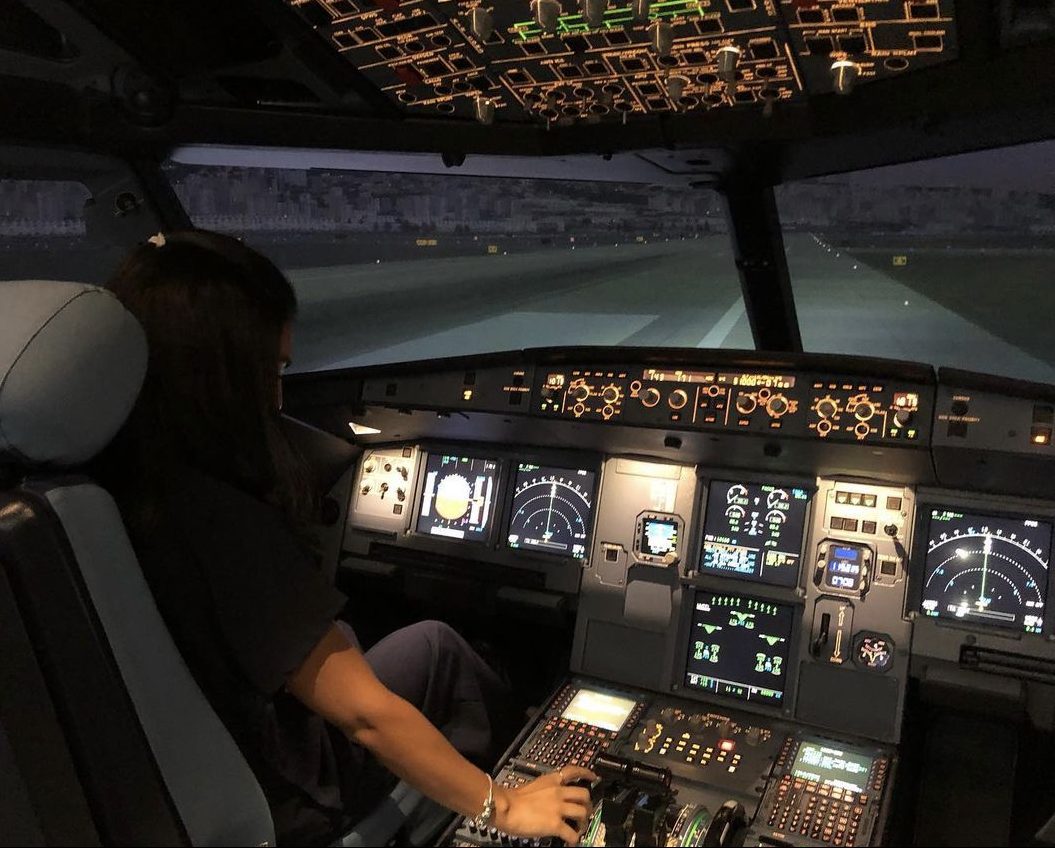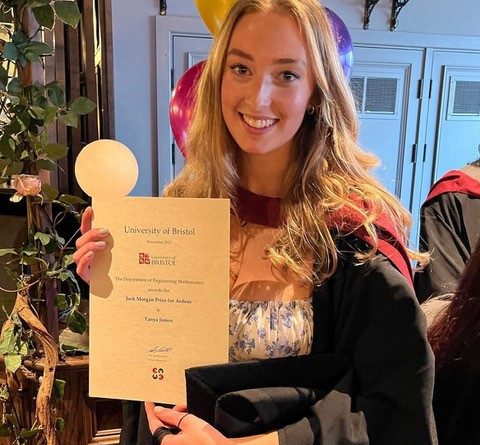Safety In Engineering: As told by past and present students
On International Women in Engineering Day, learn how current Aerospace Engineering student, Sara Ibrahim, and recent MSc Engineering Mathematics graduate, Tanya James, are prioritising safety through Engineering.
Sara Ibrahim, current Aerospace Student
Q: Let us get to know you
A: Hi I’m Sara – a current Aerospace Engineering student here at the University of Bristol, originally from Lebanon. From a young age, I’ve always been captivated by the wonders of flight, fuelling my passion for Aerospace Engineering. Outside of my studies, I enjoy completing jigsaw puzzles, cooking, and bouldering, which keeps me active and inspired.
Q: What is the defining moment of your studies so far?
A: One of the best moments of my academic journey was winning the Joe Morall Award from the Royal Aeronautical Society which was for a presentation I did on bio-inspired flight. This is an area of exploration where engineers take inspiration from nature to create safer, and more environmentally conscious aircraft.

The project that played a significant role in earning this accolade was Dr. Ben Wood’s SABRE project, which applies biomimicry in rotorcraft design, drawing inspiration from the adaptive qualities of fish fins. This technology has the potential to improve rotorcraft efficiency, reduce noise levels, and enhance safety.
As biologist Janine Benyus once said, “Nature has already solved all the challenges we face”. These words have motivated me to explore the world of bio-inspiration further for aerospace solutions.
Q: How did it feel to win the award?
A: Having my work acknowledged by an organisation as prestigious as the Royal Aeronautical Society was an absolute dream come true! It filled me with overwhelming joy, pride, and gratitude. It has made me want to strive for excellence and push the boundaries of knowledge in Aerospace Engineering further. It has also opened doors for me in terms of networking opportunities and potential collaborations with industry experts, which I am truly excited about.
Q: Who or what inspired you to pursue studies in Aerospace Engineering?
A: Amelia Earhart, the legendary aviator and trailblazer, has been a huge source of inspiration to me. Her fearless determination to challenge societal norms and break barriers in aviation exemplifies the endless possibilities and excitement within the aerospace field. Her achievements, along with the innovative work of engineers like Burt Rutan and Elon Musk, have fuelled my passion for this dynamic and transformative field.
Q: What are your hopes for the future of Engineering?
A: I think a culture of innovation, sustainability, and inclusivity is highly important in Engineering. I hope to see engineers pushing the boundaries of technology, and designing ground-breaking solutions to global challenges. I’d particularly like there to be a focus on sustainability and eco-friendly technologies, reduced carbon emissions, and sustainable practices. I’m confident that as we get a better understanding of nature, bio-inspired solutions will shape the future of Aerospace Engineering. That’s something that excites me very much.
I’d like to see more done to promote engineering as an inclusive and diverse industry. That means equal opportunities for individuals of all backgrounds and identities.
Tanya James, Engineering Mathematics graduate
Q: Tell us a little about yourself…
A: Hi I’m Tanya, a 2022 University of Bristol graduate with an MEng in Engineering Mathematics. Since graduating, I have been working at Apple as a Data Scientist and Technical Project manager (depending on the project!).
Q: Tell us some more about your time at the University?
A: Whilst at University, I was involved with the Bristol Engineering Mathematics Society (BEMS) taking up the role of Social Secretary between 2019 and 2020 and then as President up until 2021. I also enjoyed playing netball – we had a mixed team that did surprisingly well in the league!
Alongside my studies, I helped set up a non-profit project which involves installing water plant systems in a community in Bangladesh. I will always appreciate how supportive the university and various societies were of this initiative.
Q: Could you talk to us about the research project you undertook in your final year?

A: For my final year Engineering Mathematics dissertation, I was modelling the use of drones for delivering Humanitarian Aid in World Crises. In partnership with a start-up, I was modelling the interaction between the hubs (where the UAVs/drones are based) and the delivery drop-off points. Focusing on the use case of delivering food supplies to refugees in remote refugee camp, for example in Sudan. I applied graph-based black-box optimisation methods in order to analyse the optimal hub locations for these UAVs/drones.
Q: What inspired your research?
A: There are over 345 million people facing food insecurity worldwide, a figure that has doubled since 2020! There are too many locations in the world that are inaccessible for on-ground transportation. For example, roads in Sudan cannot be accessed by land-based vehicles for up to 75% of the year. This makes it extremely hard to provide the necessary supplies to keep a population alive.
Drones are a solution to tackling this challenge and there are successful case studies of emergency medical supplies being delivered to areas within Rwanda.
The next step is designing a sustainable and scalable solution that can offer longer-term aid to those in need.
Q: If you could give a younger person one piece of advice, what would that be?
A: Be curious and proactive and figure out what you do and don’t like!


